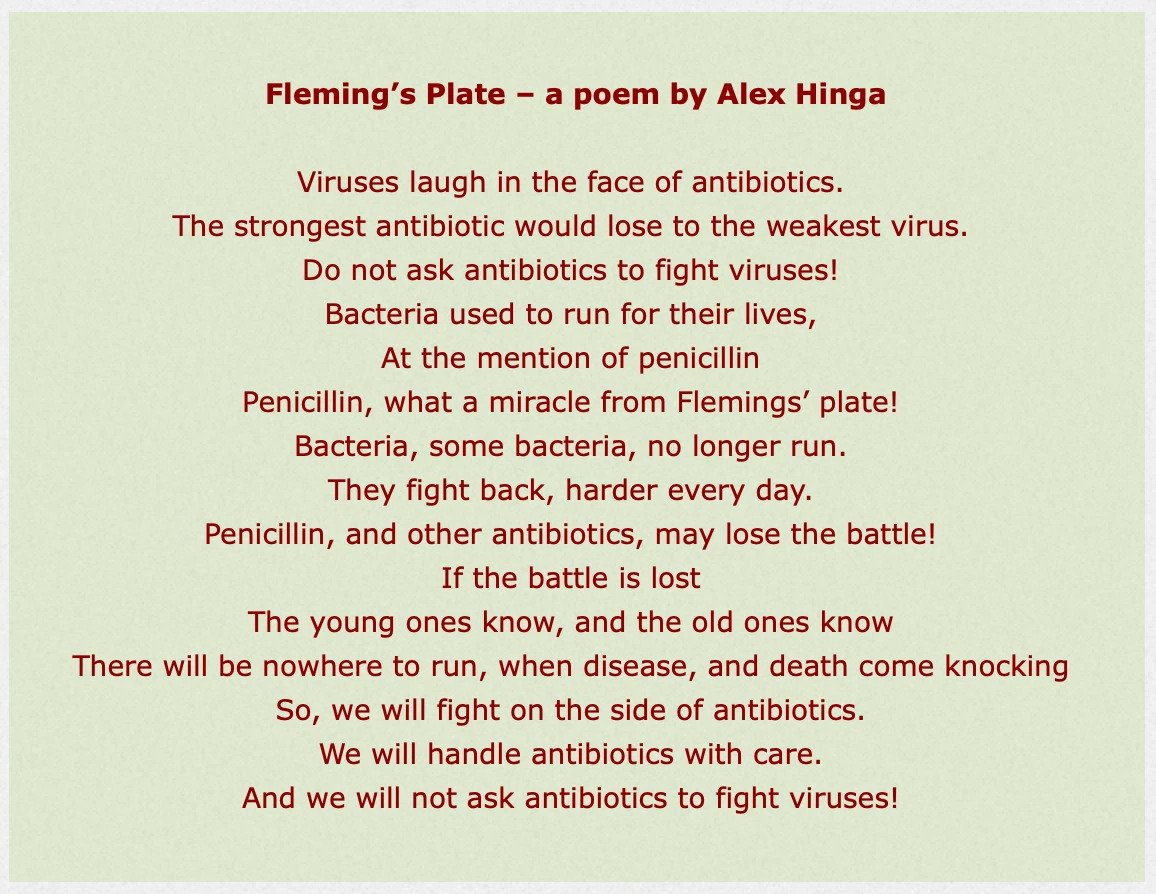The YAAR! Project
The YAAR! Project brings together young people from four countries in the Global South to help combat the challenge of antimicrobial resistance (AMR), or drug resistant infections.
Central to the YAAR! Project was a collaboration with young people from four countries in the Global South: Kenya, Nepal, Thailand, and Vietnam. These young people are working together with the YAAR! Project team to do two things:
-
to identify and evaluate age-appropriate messages about AMR
-
to identify effective platforms for engaging and empowering young people to act to mitigate the increasing global health risks that AMR brings.
The project is happening in two phases. In the first rapid pilot phase (taking place in 2020) we will:
-
conduct research (online survey, postcard survey, and telephone survey), including participatory youth-led research, into knowledge and awareness of AMR amongst children and youth
-
work with our AMR Youth Working Groups to co-design age-appropriate messages for children
and youth about tackling the global health challenge presented by AMR -
test these messages through engagement activities during World Antimicrobial Awareness Week (WAAW) 2020.
In phase two (2021) we will work together with our AMR Youth Working Groups to develop of a framework for learning about AMR. This will identify key points of knowledge and understanding appropriate to different age groups, as well as effective ways of delivering these across a diverse range
of settings and learning environments.
The project is being delivered in collaboration with and funded by, Wellcome.
Read more about YAAR! Team here
Young people’s involvement in YAAR!
In appreciation of the vital and vibrant role that young people can bring to world issues, this project involves young people throughout the process of research, identifying and evaluating age-appropriate messages about AMR and effective platforms to engage and empower young people to act to mitigate the increasing risks that AMR brings.
In each project country, a group of eight to twelve young people has come together in Youth Working Groups (YWGs). They have led peer-to-peer surveys and interviews to help inform appropriate language and messaging about AMR, as well as to capture their peers’ existing knowledge of AMR. Based on this they are advising on key messages and designing engagement activities to deliver these. Follow these links to find out more about what the YWGs in each country have been doing: YAAR! Kenya, YAAR! Nepal, YAAR! Thailand and YAAR! Vietnam.
A project-wide Youth Advisory Group, consisting of two young people from each country, has advised the project team and helped support the YWGs. The YWGs have developed engagement messages to reach their peers during World Antimicrobial Awareness Week (WAAW), which took place between 18 and 24 November 2020. These include short films, comic strips and memes all promoting appropriate antibiotic usage and increased knowledge about AMR.
The project team has also designed an online survey (translated into five languages) which has been distributed to children and young people in seven countries: Nepal, Indonesia, Thailand, Vietnam, Ghana, Kenya, and Uganda. The simple survey captures current knowledge about microbes, antibiotics, antibiotic resistance and the role of agricultural use of antibiotics in spreading resistance (One Health). Read about the results of the survey here.
This is how we are working together and how we hope to have an impact on AMR:
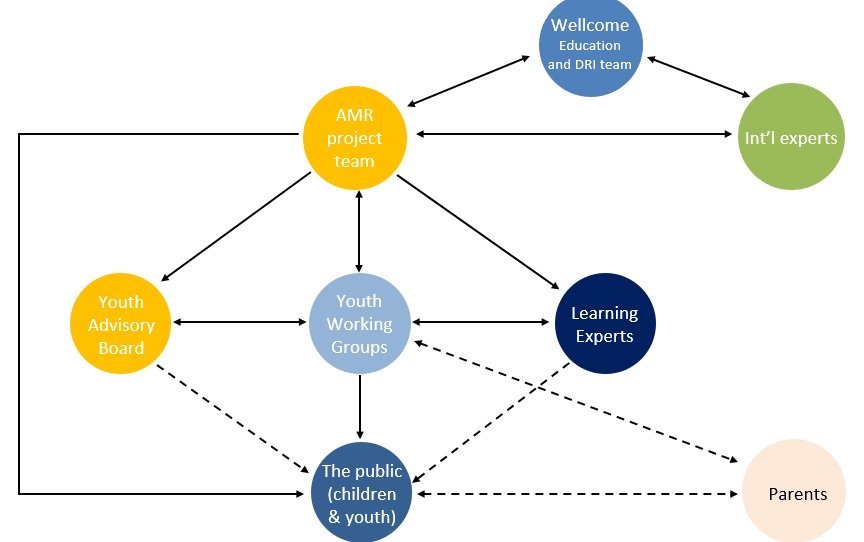
Watch and read the outputs created by the young people here
Comic: AMR is one of the global human health threats
In response to the World AMR Awareness Week (WAAW) 2021, OUCRU has teamed up with young people from the Youth Against AMR (YAAR) project, and 2030 Youth Force Vietnam to develop a series of activities for the week 18-24th November.
These aim to increase a better understanding of AMR amongst Vietnamese young people and also to promote doable actions that young people can take to be part of the solutions, reducing the impacts of AMR on human health in their communities.
Activities include:
-
Host a participatory youth-AMR expert workshop: Understand about AMR
-
Design a series of AMR posters and comic for young people: Understanding and actions to prevent AMR.
Youth using catchphrases and cartoons to raise awareness about AMR in Vietnam
As part of the YAAR! Project, eleven students from secondary schools and universities in Ho Chi Minh City have come together as a Youth Working Group (YWG). They have created engaging messages for World Antibiotic Awareness Week 2020. With the support of a Youth Advisory Group, the team turned six catchphrases into cartoons and memes for a target audience of young people in Vietnam. You can see them here:


These messages have been widely shared in posts on the Facebook pages of organisations such as WHO (Vietnam), UK in Vietnam, USAID Vietnam, and local universities. Many people have commented that they found them 'funny', 'interesting', and 'easy to understand'.
AMR poem from YAAR! Nepal
Swikriti Adhikari, YAAR! Nepal Youth Working Group volunteer has jotted down her experience of learning about and raising awareness of antimicrobial resistance into a beautiful poem.
'Mother, baby, me and AMR', a poem by Aakrit Dahal, Medical Officer
Littleboy,
comes Knocking
at the door of OPD,
Smiling face; runny nose, Mild fever
and frightened like seeing a deer
I said “Come in Dear”
Mother said ‘He has a fever.’
I replied, ‘‘I am here to care.’’
In a trembling voice,
she said he wasn't feeling nice.
“Don't worry don't worry.
Let's see if there is anything to worry.”
Measuring the fever;
it's 101 dear.
The mother wanted a pill,
That could instantly heal.
“How could a mother see one's child suffer?
Doctor, please don't bluffer.
I am in a hurry.
Give me a pill to relieve my worry.”
I demanded a blood test,
WBC; CRP; Blood culture.
‘Doctor!’ she yelled loudly “Are u a vulture?”
“Why?’’ I asked,
Feeling low but with a smile
“‘The test is going to take a while
and I don't have the time or the money for test
But I want medicine which is best.”
“Ma’am”; I said,
Frowning face, she made,
“ I am not a magician to give a pill to heal.”
She said, “I need a pill right now for the bug to get killed.”
“Ma’am…” I explained and asked for consent.
“Doctor, don't you think you are acting ancient??”
She shouted at me in a loud voice.
I tried helping her but I had no choice.
She stood…banged the table,
grabbed her child and went with a frown.
But that was the only way,
I sat there like a clown.
As I heard, she visited a pharmacy just nearby.
Spent hundreds of rupees thereby.
Her child got better ... Happy she was. So was I.
Similar fevers came a few more times.
She repeated the same act just as in rhymes.
Few years passed by,
She got into the habit of taking antibiotics from nearby.
Now, again, her kid had fever.
But this time the magical pill didn't healed
The fever was so high, he was nearly killed.
She came to me in tears.
I told her again,” We are here to care.”
This time, she herself wanted the blood test.
But the baby was too sick and wanted to rest.
We admitted him in a children’s ward.
We could see the report on his chart.
Strong IV antibiotics were what he was given
Blood infection was what he got;
chances not to be taken
Small hand with a large canula.
Blood culture showed Salmonella.
Looking at the report made us shocked.
The ordinary and potent antibiotics couldn't work.
Costly antibiotics made the boy weak.
She apologized for acting like a freak.
His smile was slowly growing,
His blood infection was slightly lowering.
Now, after months of stay and cycle of Amikacin,
He was discharged with tons of medicine.
The pharmacy didn't treat the core.
“Your child was prescribed antibiotics for viral infections.
For which antipyretic could have easily done.”
Now the mother asked “Was it AMR?”
It is an example of where we are.
You are just a prototype.
Antibiotics use are in the hype
How do I avoid this hype?
Blood test is what we ask;
Simple test to ease our task.
Prescribe antibiotics only when it's needed.
We want the infection to be quickly treated.
But before the results are there,
There’s something empirical.
Sometimes this can act as a miracle.
When in doubt, always visit us.
Blood test without a rush.
AMR should be taken care of with a correct choice.
It's another way to make us healthy wealthy and wise!!!
Knowledge of antibiotic resistance shared in northern Vietnam
The YAAR! Youth Working Group (YWG) in northern Vietnam recently organised a series of activities to celebrate 2020’s World Antibiotic Awareness Week. This YWG includes four members, aged 17-20, who have worked under the auspices of YAAR! since September to help educate youth about the importance of responsible antibiotic use. On 20 November 2020, in the rural province of Nam Dinh, the YWG held a village event, where 28 children and young individuals participated in a quiz on the topic of bacteria and antibiotics.

In Hanoi, the YWG hosted a similar quiz on 22 November, which attracted 21 college students spanning the disciplines of pharmacy, banking, and computer science.
Outside of these planned events, the YWG further engaged their friends at school in talks about antibiotic resistance by sharing comics on this topic.

Be Antibiotics Aware!
The YAAR! Nepal team came together (virtually) to raise awareness against AMR and produce this image. It aligns with the theme of World Antimicrobial Awareness Week (WAAW) 2020: “United to preserve antimicrobials”. It aims to depict the message that we all need to come together for prudent use of antimicrobials.
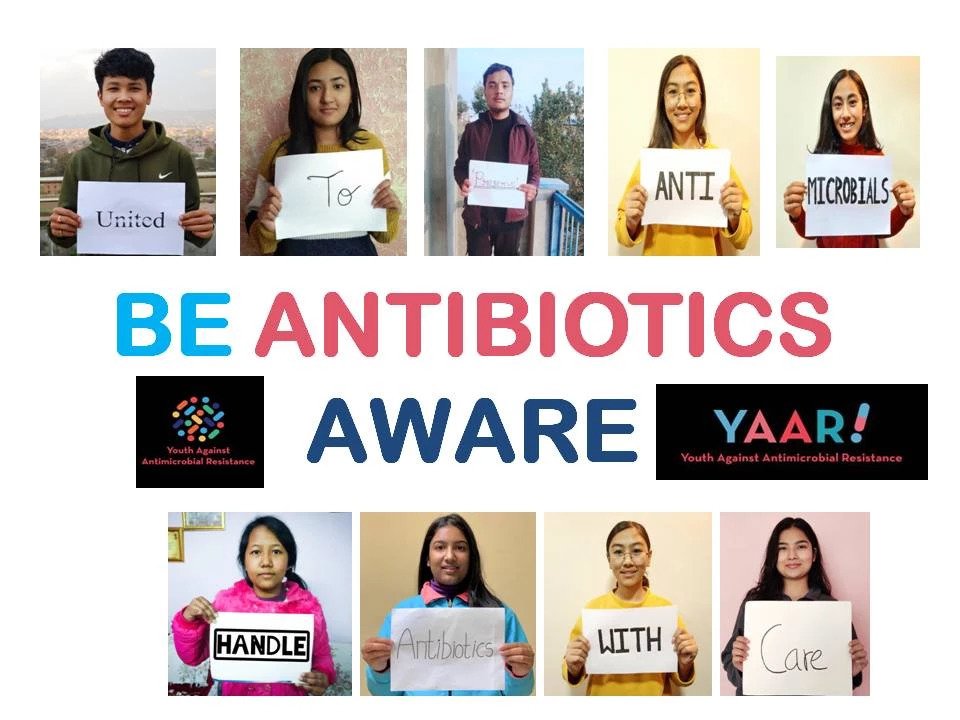
AMR photography competition
AMR through the eyes of the Youth Working Group (YWG) is a photography competition organised to assess what the YAAR! YWG volunteers from Nepal understood about AMR. Five of the eight members of the YWG, all between the ages of 16 and 20, participated in the competition. Since the end of September 2020 they have been attending weekly meetings and hearing from microbiology experts. This event was organised to mark World Antimicrobial Awareness Week 2020.

TB or not TB
A mother takes her teenage son to the hospital after the son becomes severely ill at home.
This short film (TB or not TB?) was conceived and produced by young people in Kilifi, Kenya, as part of the Youth Against Antimicrobial Resistance (YAAR!) project.
Actors include Tumaini Donald, Ellison Nyanje, Joyce Mwanza and Sera Fellister.
The Pint of Science @ Antibiotic Awareness Week 2020
The Pint of Science @ Antibiotic Awareness Week 2020 was a special 3-hour event held on 17 November 2020 in Bangkok, and organised to coincide with the Thailand Antibiotic Awareness Week (AAW) and World Antimicrobial Awareness Week (WAAW). Thailand’s AAW aims to increase awareness of antimicrobial resistance (AMR) and to encourage best practices among the general public, health workers and policy makers to avoid the further emergence and spread of drug-resistant infections. Thailand’s AAW was initiated in 2013 by the Drug System Monitoring and Development Center (DMD) and stakeholders as an activity to tackle the problem of AMR in Thailand.
In 2017, the consumption of antimicrobial agents in Thailand was 6,850 tonnes. 2,162 tonnes (or 32%) of this was used for human consumption, and 4,688 tonnes (or 68%) was used for consumption in animal and agriculture.
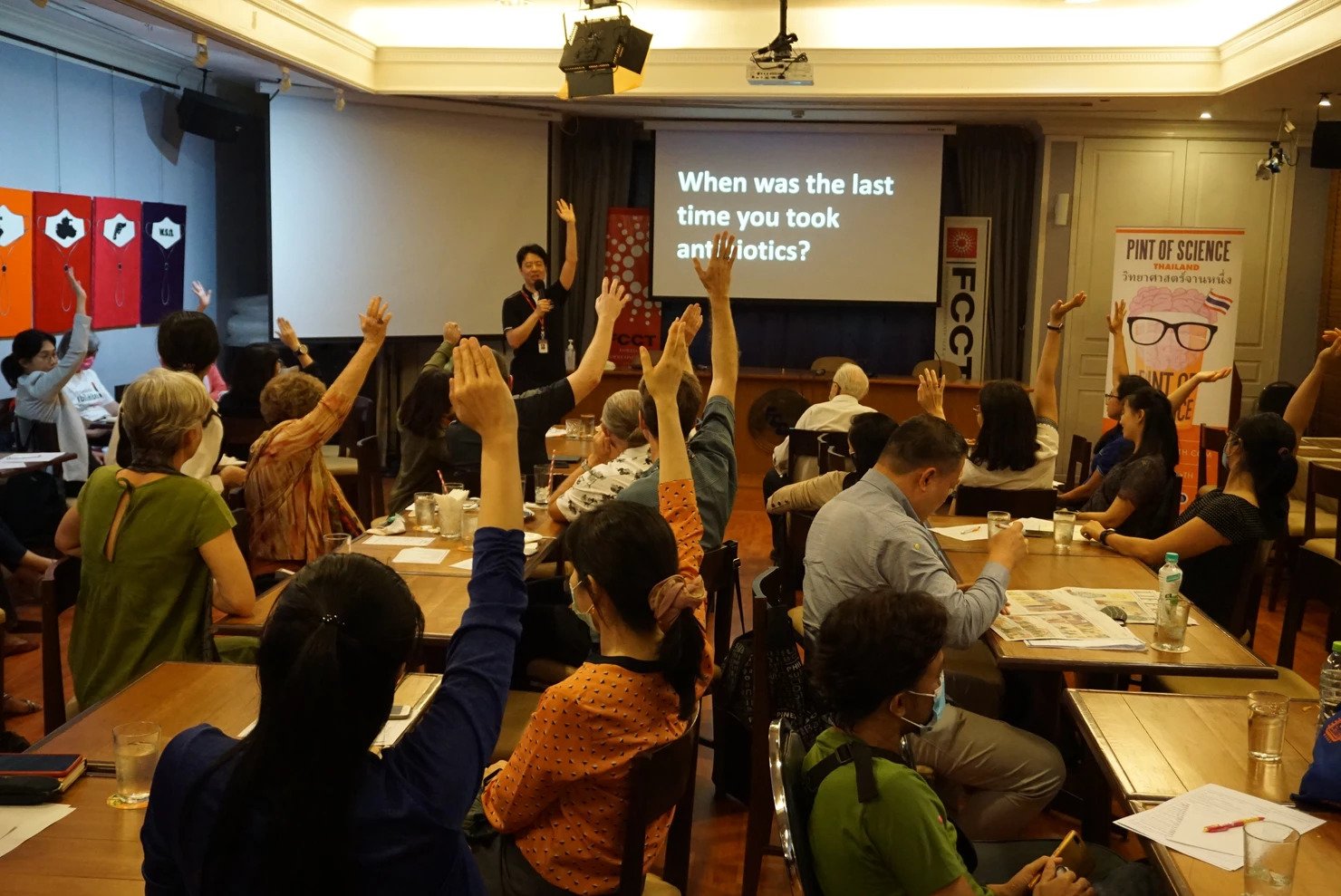
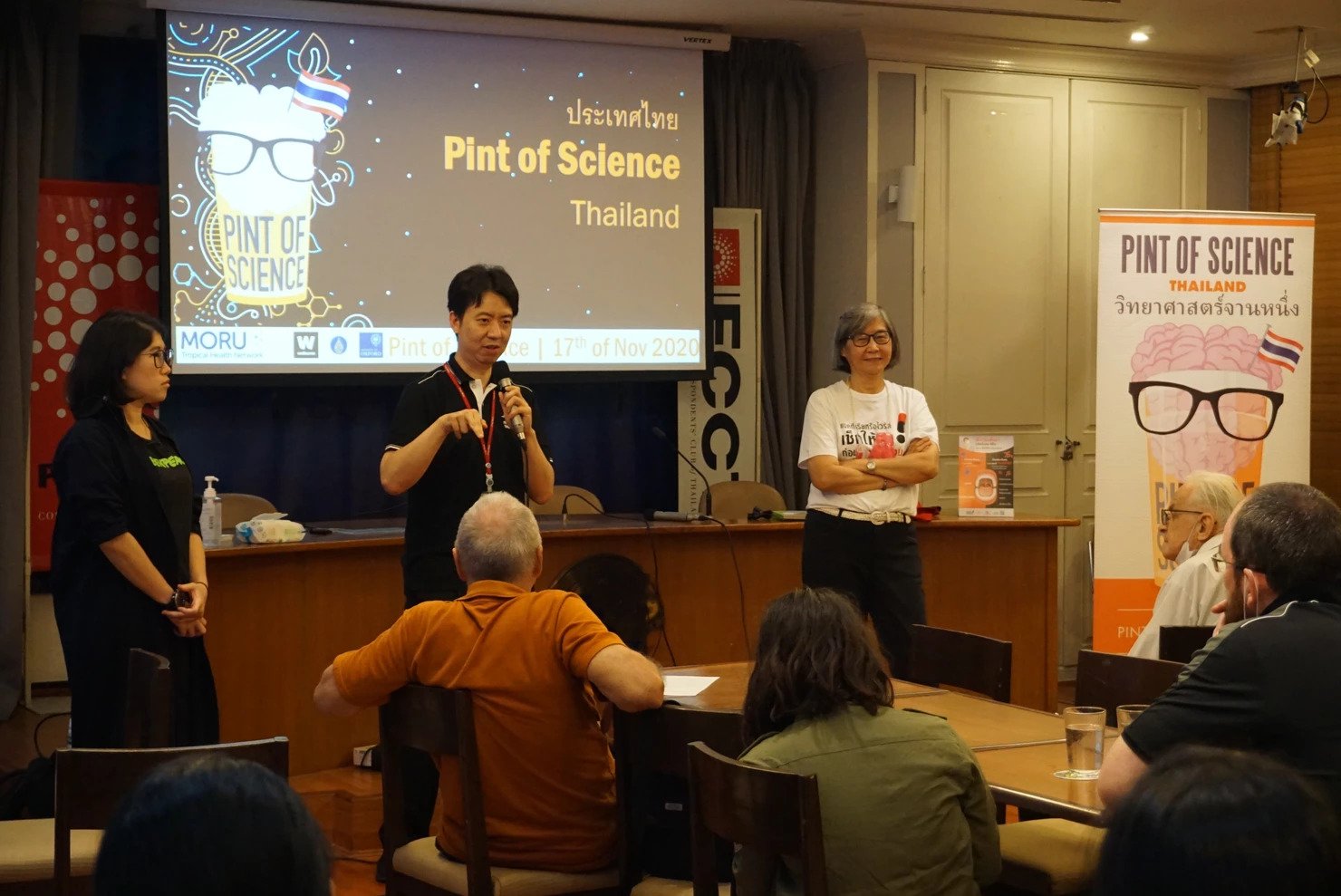
Three experts talked about the different aspects of AMR: Associate Professor Direk Limmathurotsakul from the Mahidol Oxford Tropical Medicine Research Unit (MORU), Assistant Professor Niyada Kiatying-Angsulee from Drug System Monitoring Mechanism Development Centre, and Rattanasiri Kittikongnapang from Greenpeace Thailand. The event was attended by nearly 40 people in person and live streamed on Facebook. Click here for more information on the talks.
Pint of Science is a global festival that brings scientists to share their latest research with the general public. Pint of Science Thailand is organized by MORU.


